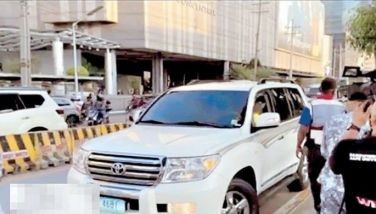This Chinoy tycoon’s way: Philanthropy over profit

What excites Carlos Chan about business is not so much the profit than the philanthropy. He makes sure his giant Liwayway Holdings makes lasting impact on communities around its sites. The success of his Oishi food and drinks, made by 28 factories Asia-wide, he attributes to hard work, smart personnel and Divine Providence. The first two he treasures, the third he gives back — with gusto.
His newest venture — cassava farming — reflects Mr. Chan’s way of giving over gaining. Flour is among the Oishi line’s main ingredients. Liwayway’s 15 factories in China and four in the Philippines import most of it from Thailand and Vietnam. So backward integration, into producing its own flour from cassava, makes good sense. Food being globally the lowest-margin business, tight reins must be put on all production inputs, spending, and real estate. That’s the duty of Mr. Chan’s wife Priscilla; sons Archie, Larry, and Oszen; daughters Rinby and Shera; and Liwayway managers. Mr. Chan’s self-assigned mission is anti-poverty.
By sheer chance was a cassava processor in Carmen, Bohol (pop. 30,000), offered to Mr. Chan last year by a friend of Archie’s. He visited the 60-hectare site and saw the surrounding infertile land there and in adjacent Sagbayan (pop. 20,000). Informed that cassava needs little watering after the first three of ten months’ gestation, he studied how planting the tuber could help the impoverished folk.
With local partner Jovie L. Sepe, a plan was laid out. About 2,000 farmers owning some 4,000 hectares would be contracted to grow cassava. Stalks, Rayong variety from Thailand’s highest-yield region, are to be distributed free: one per square meter or 10,000 per hectare. Fertilizer and farm equipment are to be lent through cooperatives. Technicians would train farmers to produce two kilos per mature stalk, or two tons per hectare, eventually rising with knowhow to 30 then 40 tons. Liwayway’s local Silangan Agri-Product Ventures Corp. guarantees to buy back harvests. The target is for farmers to make at least P2 per kilo, or P20,000 per hectare, again rising with improved yields to P30,000 then P40,000. Entrepreneurial locals would be assisted to buy trucks to haul harvests to the processing plant. “Business with puso (heart),” it’s described by Frankie Breva, Mr. Chan’s brother-in-law who helps out.
“We (Silangan) don’t expect to earn at once,” Mr. Chan says of the P100-million project. “The farmers come first.” The aim is for word to spread so others would plant. Liwayway would buy all the flour it can from Bohol. “If others want to put up processing plants, we’ll help them,” Mr. Chan chuckles, “The more the merrier. For why should we import when we can produce, and at the same time enrich our farmers?”
Mr. Chan and Archie were breakfasting with farmers in Carmen when earthquake struck on Oct. 15 last year. Since they were right at the epicenter, Mr. Chan took it as an omen of earth-shaking import. By Feb. 2014, the long-idled processor was running again. He also plunked in a huge amount for charities to feed the shocked barrio folk, and for Tzu Chi Foundation to rebuild damaged schoolhouses island-wide.
Part of the plan is to open next year another processor in Cagayan de Oro, for Bukidnon farmers, at another P100 million. Liwayway will produce cassava starch as well, for food, feeds, beer, and bioethanol — and anti-poverty.
Knowing that poverty is not just a social but also a mental state, Mr. Chan focuses on youth development. He finances youth travels to broaden minds. Bohol’s Loboc Children’s Choir he has sent twice to perform in Shanghai and Beijing. He is currently in Dezhou, Shandong, China, where is buried Sulu Sultan Paduka Pahala, who died in 1417 on the way home from visiting the Emperor. Mission, with eldest son Carlson, in charge of new businesses: enlighten two batches of 50-plus young folk dancers from Tawi-Tawi about their Taosug heritage.
Anti-poverty knows no boundaries. Liwayway’s China operation, under Larry, also is backward integrating into dairy farming. Mr. Chan immediately saw potential to uplift Inner Mongolia’s steppe-dwellers, so is considering locating there. In 2009 he brought earthquake-stricken youths from inner-mountain Sichuan province to the Philippines to learn about Chinoys. Highlights of the trip: a visit to Malacañang Palace and, to the astonishment of the youngsters who hadn’t ever seen one before, the seashore.
Liwayway means dawn; Silangan, east. With the company names, Mr. Chan takes life to mean an unending new day to keep giving.
* * *
Tzu Chi Foundation deserves praise for the relief work in Leyte right after Super Typhoon Yolanda struck a year ago tomorrow. Assisted by chapters worldwide, it gave away P1.2 billion in weeks of cash-for-work, basically for victims to clean up their surroundings for their own sanitation. It not only provided money for basic needs, but more importantly restored dignity from tragedy. Thermal blankets made from recycled plastic were distributed also with sacks of rice. More cash was poured into reconstructing homes, schoolhouses and playgrounds to restore normalcy in children’s lives. Applause, please, for untiring Tzu Chi-Philippines president Alfred Li and his volunteers.
* * *
Catch Sapol radio show, Saturdays, 8-10 a.m., DWIZ (882-AM).
Gotcha archives on Facebook: https://www.facebook.com/pages/Jarius-Bondoc/1376602159218459, or The STAR website http://www.philstar.com/author/Jarius%20Bondoc/GOTCHA
E-mail: [email protected]
- Latest
- Trending


























